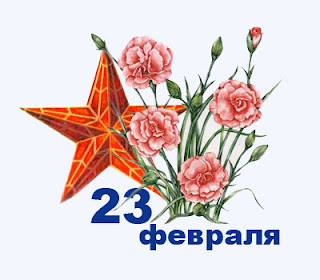Defender of the Fatherland Day (Russian: День защитника Отечества / Dyen' zashchitnika Otechestva, Ukrainian: День захисника Вітчизни) is a holiday observed in Russia, Tajikistan, Kyrgyzstan, Ukraine, Belarus and several other former republics of the Soviet Union. It is celebrated on February 23.
History
The holiday marks the date in 1918 during the Russian Civil War when the first mass draft into the Red Army occurred in Petrograd and Moscow. It was originally known as Red Army Day (Russian: День Красной Армии / Dyen' Krasnoy Armii). In 1949, it was renamed Soviet Army and Navy Day (Russian: День Советской Армии и Военно-Морского флота / Dyen' Sovyetskoy Armii i Voyenno-Morskogo flota). Following the fall of the Soviet Union in 1991, the holiday was given its current name.
Celebrations
Officially, as the name suggests, the holiday celebrates people who are serving or were serving the Russian Armed Forces (both men and women), but unofficially, nationally it has also more recently come to include the celebration of men as a whole, and to act as a counterpart of International Women's Day on March 8.
The holiday is celebrated with parades and processions in honor of veterans, and women also give small gifts to the Russian men in their lives, especially husbands (or boyfriends), fathers and sons. As a part of the workplace culture, women often give gifts to their male co-workers. Consequently, in colloquial usage, the holiday is often referred to as Men's Day (Russian: День Мужчин, Den' Muzhchin).
Variations
In Tajikistan, the holiday is known as Tajik National Army Day (Tajik: Рӯзи Артиши Миллӣ Тоҷик).
In Chechnya and Ingushetia this holiday is celebrated with mixed feelings, because February 23, 1944 is the date of the mass deportations of Chechens and Ingush to Central Asia. (See also, Operation Lentil, Population transfer in the Soviet Union) The entire holiday is extremely controversial for Chechens and Ingush because of the date












0 comentarios:
Publicar un comentario